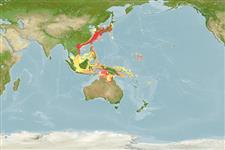Malacostraca |
Decapoda |
Latreilliidae
Environment: milieu / climate zone / depth range / distribution range
Ecology
Benthic; depth range 30 - 307 m (Ref. 84669). Subtropical
Western Pacific: Japan and Southern Korea to Taiwan and the Philippines.
Length at first maturity / Size / Weight / Age
Maturity: Lm ? range ? - ? cm Max length : 1.2 cm CL male/unsexed; (Ref. 84670); 1.4 cm CL (female)
Life cycle and mating behavior
Maturity | Reproduction | Spawning | Eggs | Fecundity | Larvae
Members of the order Decapoda are mostly gonochoric. Mating behavior: Precopulatory courtship ritual is common (through olfactory and tactile cues); usually indirect sperm transfer.
Castro, P., A.B. Williams and L.L. Cooper 2003 Revision of the family Latreilliidae Stimpson, 1858 (Crustacea, Decapoda, Brachyura). Zoosystema 25(4):601-634. (Ref. 77901)
IUCN Red List Status
(Ref. 130435: Version 2025-1)
CITES status (Ref. 108899)
Not Evaluated
Not Evaluated
Threat to humans
Human uses
| FishSource |
Tools
More information
Trophic EcologyFood items (preys)
Diet composition
Food consumption
Predators
Population dynamicsGrowth
Max. ages / sizes
Length-weight rel.
Length-length rel.
Length-frequencies
Mass conversion
Abundance
Life cycleReproductionMaturityFecunditySpawningEggsEgg developmentLarvae PhysiologyOxygen consumption
Human RelatedStamps, coins, misc.
Internet sources
Estimates based on models
Preferred temperature
(Ref.
115969): 12.1 - 27.2, mean 21.4 (based on 393 cells).
Fishing Vulnerability
Low vulnerability (10 of 100).
